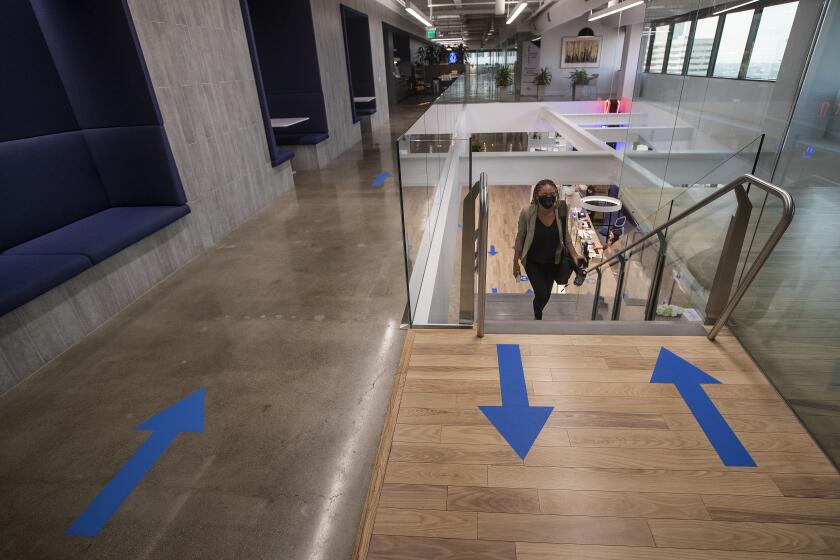The ultimate guide to working remotely forever

- Share via
Have you been working from home since March 2020? Hearing rumblings that you’ll be expected to go back to in-person work this year? If the thought of returning to your physical workplace unsettles you, this guide is for you.
Over the last few months, The Times has heard from readers who expressed dismay at the thought of sharing space and air with colleagues again, resuming soul-crushing commutes and juggling child care and elder care with the less-flexible demands of in-person work.
The good news: Some companies have become more accommodating of flexible work schedules and permanent remote work. The tricky bit is that the arrangements are often up to employees and prospective employees to negotiate.
We spoke with several experts on negotiating work-from-home agreements with employers. Here are some tips:
Do your research
Before asking your manager if you can work from home permanently, find out whether any other employees have been granted this benefit.
“Do your homework, see if these kinds of options have been offered to others,” executive coach Bonnie Marcus said. You should also read any company policies relating to remote work, especially communication issued after the pandemic began.
Most people say they aren’t ready to give up working from home. Some bosses are looking at a hybrid model. Others are eager to bring workers back.
Speak up — because policies are being crafted right now
Be transparent about your desire to work remotely. “If an employee wants to continue to work from home, they should share their perspective with their manager,” career coach Angela Copeland said. “Not all companies are willing or able to accommodate such requests long term, but if you don’t speak up, your manager won’t know.”
In many workplaces, remote work arrangements are generally decided categorically rather than on a case-by-case basis, employment advisor and litigator Michelle Strowhiro said. Employers usually don’t want to give an exception to one person that they wouldn’t give to another worker in a similar role.
That’s why it’s important to speak up about your wishes to work remotely now, before official policies are crafted: “Now is the time to help shape those policies.”
If you’re interviewing for a new job, you may benefit from being candid about your wish to work remotely. “I wouldn’t advise waiting until you get an offer,” said human resources consultant Denise Pinkett. If the job requires work from the office, “you get to the finish line, and there’s no meeting of the minds.”
Have a plan in place
Approach management with a plan for what you want and how you can continue to get your work done effectively. This includes information such as proposed work hours and how you’ll handle meetings with colleagues who are working in person. “It goes back to building that trust. So they know that there’s a plan in place,” industrial and organizational psychologist Sertrice Grice said.
Understanding your employer’s potential concerns about a permanent remote work arrangement can be key to crafting a successful plan. For example, if your manager wants every worker to attend big meetings in person, you could agree to travel to the office once every few weeks for larger gatherings.
Some of us are hoping that a year of remote work will lead to greater job flexibility. Others can’t wait to get out of the house.
Make a business case — as well as an emotional case
Be sure to emphasize how a remote work arrangement would make sense for your team and the business as a whole. “A business case will always help push you further along,” Pinkett said.
For example, if you’re part of a global team based in Southern California but want to work remotely from New York, you could be better equipped to interact with European clients by working East Coast hours. “Those kinds of things are really compelling,” said organizational psychologist Lauren Catenacci.
Appealing to your employer’s mission may also strengthen your case. For example, if you work for a company that caters to parents and children, Catenacci said you could have success pitching a switch to permanent remote work if you frame it as the best option for your family, as well as the business.
The office beckons. What rights and protections do you have? Will safety and vaccine issues in the workplace prompt lawsuits?
Highlight your success over the last year — and continue doing a great job
You should approach negotiation for remote work as a win-win situation for you and your employer, Marcus said. Questions to consider, she said: “How will it benefit your team? Will you be able to be more efficient, to be more productive?” Build a case that addresses the benefits of the situation.
If you’ve already been working remotely throughout the pandemic, you may have an easier time advocating to make it permanent. “You can build a case from not what you think you can do ... but actually from what you have accomplished and how productive you were” over the last year, Marcus said.
To identify your successes, Pinkett recommends looking back at feedback from your reviews and check-ins with your manager. “Celebrate your achievements and bring those forward,” she said. “And just say, ‘I can keep doing this remotely.’”
It can be helpful to showcase your successes in an organized document or slideshow, said Teresa Lee, founder of career coaching service PathUp. “Provide proof of the productivity that you have had at home.”
Showing you’re capable of working remotely is especially important if you’re applying for a new job. In addition to sharing your proficiency in the remote-work tools you’ve successfully used already, such as Asana and Zoom, Pinkett recommends offering a list of references who can speak to your professionalism.
Offer a trial period
One way to demonstrate how well you’d do as a remote worker at your current job: Ask for a trial period, during which you can showcase your ability to get your work done while at home.
Use this time to show your boss that your productivity and performance will not suffer while working remotely. Marcus also suggests working on a collaborative project with your manager during this time, which could help reinforce how reliable you are working from home.
Approach management with a counteroffer
Getting another job offer to use as leverage could be a good strategy for securing a permanent remote work arrangement with your current employer. “You have the most leverage when you have something else to go to,” Lee said.
As in all negotiations, it’s important to be cautious when attempting to leverage a counteroffer because it can backfire if you don’t actually want to leave for a new job. “Don’t leverage an offer that you would not be happy with long term.”
Consider a compromise
Even if you’re hoping to exclusively work from home, it’s worth thinking about whether you would be willing to come into the office a few days a week — or a few days per quarter — for some in-person face time.
You don’t need to disclose this willingness right away in the negotiation process, but it could be helpful in the long run. “If you really want to work from home 100% [of the time], I wouldn’t lead with that,” Marcus said. “But that could be your fallback.”
As COVID-19 recedes, California workers are being called back to the office. The office? Who remembers that place? And what will the return look like?
Set expectations
As you negotiate for remote work or flexible hours, it’s important to understand the expectations your manager has for your level of communication. How quickly do they expect you to respond to email? Are you comfortable with your boss texting you?
Setting up expectations and boundaries is key to success, especially if your boss is used to keeping a close eye on employees, Copeland said. “You may even need to agree to go out of your way to over-communicate.... You’re finding new and different ways to show your boss that you’re working.”
Get things in writing
If you’ve been offered a job and successfully negotiate for an option to work remotely, be sure to get this agreement in writing, either reflected within the offer letter or otherwise committed in writing.
If you’ve been at your company for a few years and negotiate to work from home permanently, you should at least have the agreement in writing via email. “Always follow up with an email and say, you know, ‘We had this meeting on Oct. 1, and I just want to confirm that this is what we agreed to,‘” Marcus said.
Try again later
If your boss seems resistant to granting employees a permanent work-from-home arrangement coming out of the pandemic, it could be worth revisiting the issue a few months down the line.
“It’s really hard for a boss to say everyone can be remote at this point,” Lee said. “If they say yes to one person, everyone’s going to want the same thing.” She advises that employees “wait it out a little bit ... give it six months or so, to have conversations with the boss.”
This is especially helpful if you keep doing a great job at work. “The best thing you can do to advocate for your remote work case is to do excellent work,” Lee said. “Once you’re invaluable, they will want to keep you.”
Be prepared to hear no
Despite your best efforts, your employer may still require a return to your physical workplace. “Some organizations just won’t budge,” Catenacci said.
“Many companies are offering remote work as a permanent option,” Copeland said. If you are committed to working from home, now is the time to start looking for a company that aligns to this goal.”
Look for remote jobs
If you’re looking for remote work, use keywords such as “work from home” or “flexible schedule” when searching on sites such as LinkedIn and Monster, Pinkett suggests. Employers “advertise that level of flexibility.”
At this moment, it could make sense to disregard the location of online job postings even if you have no intention of relocating, Copeland said. On an episode of a podcast she hosts, Copeland interviewed a Memphis, Tenn., professional who decided to apply to jobs in cities around the country.
“She led with her strengths and the skill that she could bring to the table” while being honest about her desire to remain in Memphis, and she found a new employer who was open to her working remotely, Copeland said. “They don’t care that she’s remote.”
More to Read
Inside the business of entertainment
The Wide Shot brings you news, analysis and insights on everything from streaming wars to production — and what it all means for the future.
You may occasionally receive promotional content from the Los Angeles Times.














